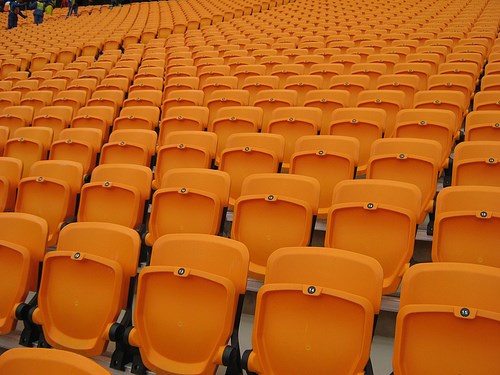World Cup afterthoughts

The seats are empty and the World Cup is over, but who can be declared the real winner? South Africa? Or FIFA? Photo (c) by Flickr user Shine 2010 - 2010 World Cup good news. Used under a Creative Commons 2.0 license.
16.07.2010
By Katja HøiriisPraise for World Cup hosts
Before leaving Johannesburg, Blatter gave “Big compliments to South Africa and to the people of this country. Also, big compliments to the South African government for meeting all the guarantees they made for the successful organisation of the World Cup” writes the Daily Dispatch.
South African officials are also very pleased with the tournament. At a news conference, President Zuma stated that “"We are sure that the investment we have made will contribute to increased tourism, trade and investment. This will ultimately create new opportunities and bring in the revenue for us to address social challenges."
The South African transport minister, Sibusiso Ndebele, praised transport operators for their efforts in ensuring smooth transportation for all during the World Cup, and stated that an improved public transportation system will be one of the key legacies of the tournament, writes the Mail & Guardian.
Before the start of the tournament, the media spent a lot of time writing about the South African crime rate and the dangers football fans and journalists would encounter by going there. However, heavy investment in security meant that South Africa managed to host an almost problem free World Cup.
A poll conducted among 400 South Africans even shows that 85% of South Africans now have more hope for a positive future for all South Africans than they did before the tournament, writes Sport24.
Actually, the tournament ran so smoothly that it has actually caused problems for President Zuma, raising expectations that his government can meet a series of unfulfilled promises in the same bold fashion, writes IoL.
The media seems to agree with Sepp Blatter that South Africa did a great job in hosting the World Cup
Critical voices ask questions
But, of course the critical voices who were there before the World Cup are still posing difficult questions now. The cost of the preparations soared while new stadia were built instead of renovating existing ones, and people ask whether this kind of spending on one event is economically responsible in a country where so many people live in poverty.
Questions about South Africa’s actual economic gain have resounded again and again since before the start of the tournament, and the brand value and the legacy left by tournament will take years to measure, argues Dr Udesh Pillay in the New York Times.
But the one who arouses the main part of the critical voices is FIFA. They have been declared the big winners of the World Cup, claiming $ 3.3 billion in television rights and marketing revenue, and have throughout the tournament been criticized for their strict marketing policies, for keeping local traders far away from the steady earnings they would get around the stadia, for not paying taxes in South Africa and for basically taking over the country.
Comments from the media
Business Day’s Paul Hoffman argues in the article "Beneath the glow of Fifa’s untaxed empire" that “Gratitude for cracking the nod from FIFA to host it should not blind the South African public to the less attractive features of the World Cup — those for which FIFA is responsible.”
Also Marina Hyde from the Guardian looks critically at the power FIFA exerts over its host countries. “We already knew FIFA could trump a medium-sized government. What South Africa underlined was the fact that FIFA can trump constitutional rights, cementing the organisation's status as a sort of travelling oligarchy, enjoying all the benefits of power with none of the disadvantages, like having to provide healthcare or be remotely accountable”, she writes in her article "Sepp Blatter's slick patter sticks in South Africa's craw".
South African cartoonist Zapiro has throughout the tournament produced comical sketches giving a critical comment the World Cup. With his cartoon, "The Holy FIFA Empire", he shows Sepp Blatter controlling the whole world while calling the roman emperors, the rulers of the British empire and Genghis Kahn amateurs.
On Indyweek.com, Chris Gaffney comments, in the article "Brazil 2014: Looking back, looking forward, going nowhere here", on FIFA’s way of managing events like these, looking ahead at the 2014 World Cup in Brazil. “South Africans really were wonderful hosts, spending public money freely so that the Swiss-based monolith could rake in a record profit. It won’t take long for FIFA to count their US$3.3 billion in revenues (for the month); it will take South Africa many decades to pay off the party” he writes.
And unless something changes radically, the same future lies ahead for Brazil he argues. “The World Cup and Olympics need to be massively reconfigured, re-scaled and re-thought, or they will continue to destroy environments, economies, communities and lives around the globe.”





